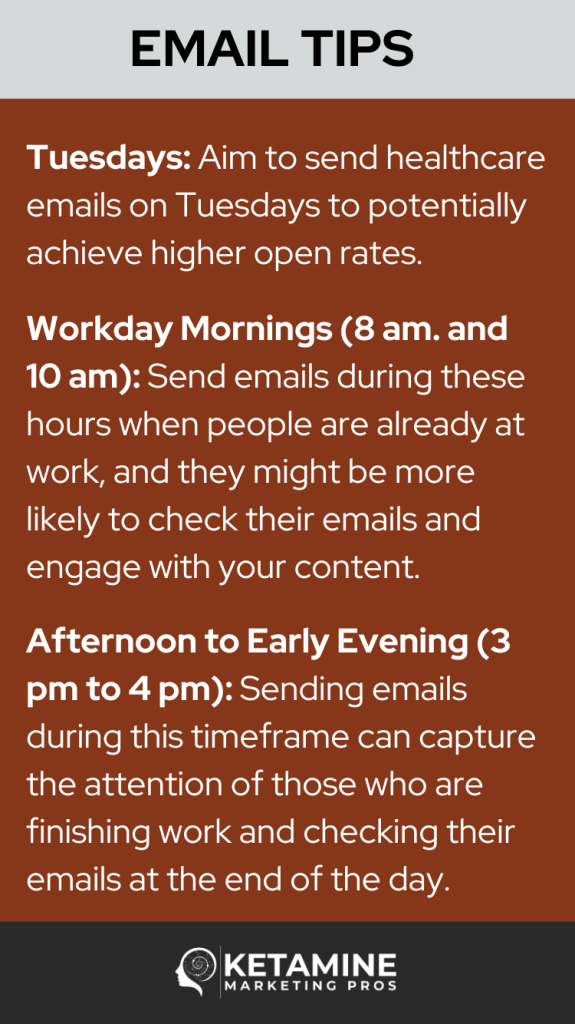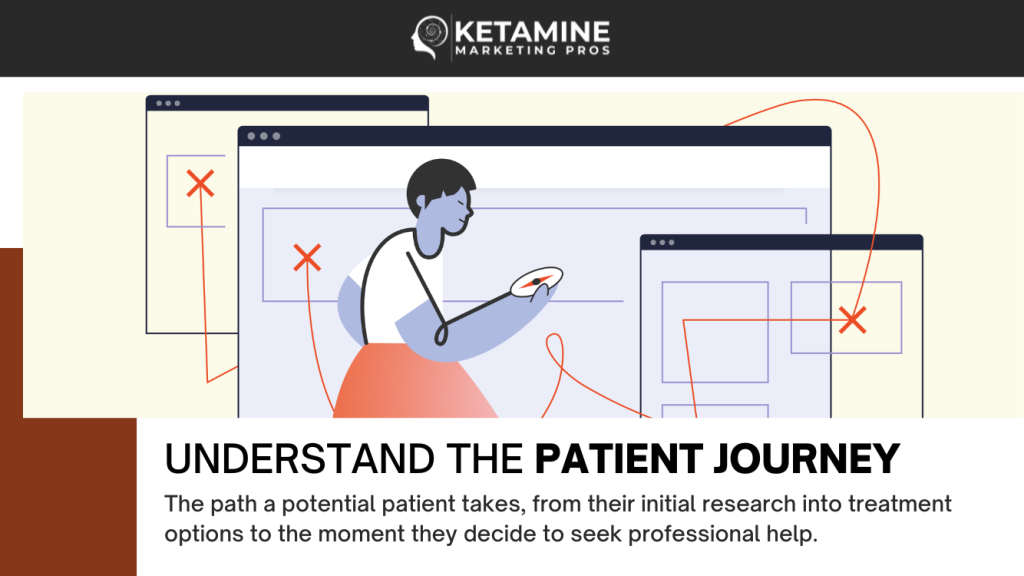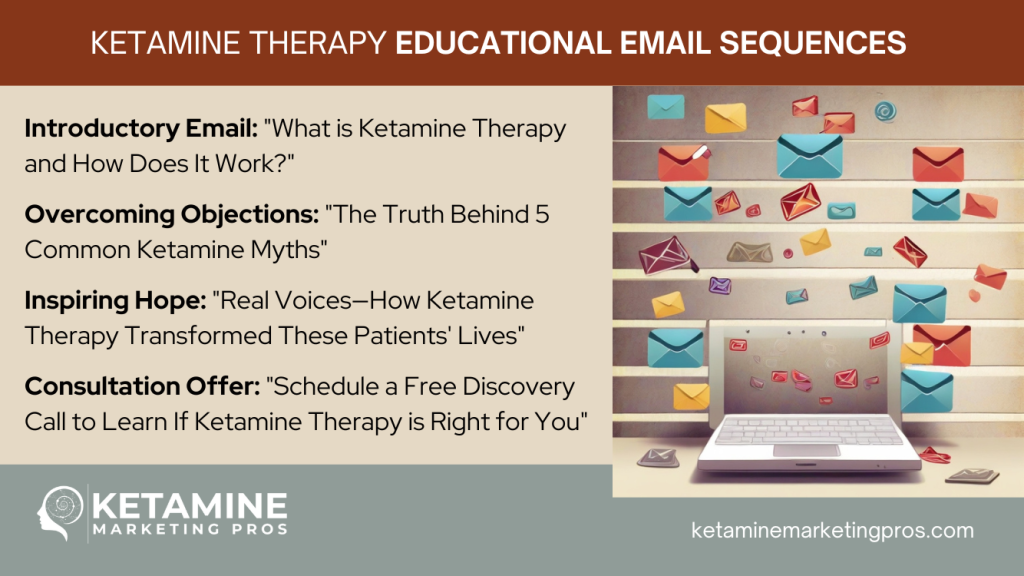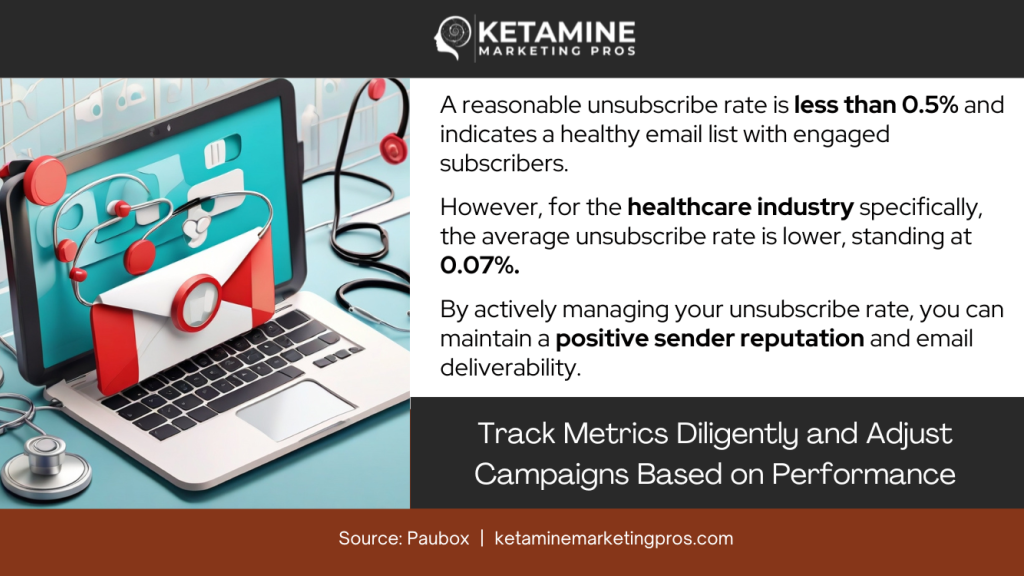
Maintaining a steady stream of ketamine therapy patient appointments is a common challenge for ketamine clinics. Despite growing recognition of ketamine’s potential to treat mental health issues like depression, anxiety, PTSD, and chronic pain, many clinics still struggle to convert interest into bookings consistently. From lack of awareness to lingering stigmas around mental health treatments, numerous barriers can cause prospective patients to hesitate before seeking care.
This is where email marketing becomes an invaluable asset. As a cost-effective, highly measurable channel that offers unparalleled personalization and targeting capabilities, email allows ketamine clinics to educate audiences, build trust, nurture relationships, and attract ketamine therapy patients to drive consistent appointment bookings—all while working within the constraints of a medical marketing budget.
In this comprehensive guide, we’ll explore why email marketing is so well-suited for ketamine therapy clinics and provide a roadmap for developing and executing a winning email strategy. You’ll learn proven tactics for attracting leads, nurturing relationships with personalized, value-driven content, and converting subscribers into patients through timely offers and outreach. Let’s dive in!
Why Email Marketing Should Be a Priority for Ketamine Clinics
While social media, search engine optimization (SEO), and other digital marketing channels all play a role in ketamine therapy clinic marketing, email marketing stands out as one of the most effective paths to filling ketamine patient appointment slots quickly and sustainably. Here’s why this channel deserves a central focus in your marketing efforts:
1. Email Is Cost-Effective with Measurable ROI
For most healthcare providers in general, operating with limited marketing budgets, maximizing return on investment (ROI) is critical. According to a 2020 study by Zippia, email marketing for mental health and counseling services is highly effective, with an average open rate of 21.09% and click-through rate of 2.37% across the industry. While these benchmarks may seem modest compared to other sectors, the mental healthcare space demands an empathetic, educational approach. From that perspective, being able to reliably reach one out of every five subscribers is an invaluable opportunity for providers.
With affordable email marketing services like Mailchimp, Constant Contact, and HubSpot, you can reach extensive lists for just pennies per message. Even better, these platforms provide robust analytics that reveal precisely how well your campaigns are performing. Key metrics like open rates, click-through rates, conversion rates, and list growth rates give you a clear picture of what’s resonating with your audience and what needs adjustment—allowing you to optimize continuously.
According to statistics, email marketing’s median ROI is 122%, which is more than four times higher than other popular digital marketing channels.
2. Email Enables Highly Personalized, One-to-One Communication
Unlike billboards, Facebook ads, or other broadcast marketing methods, email gives you the unique ability to speak directly to individuals. This personal communication style is incredibly valuable in the mental healthcare space, where patients value privacy and seek out providers they can trust.
Through email, you can thoughtfully address common questions or concerns, share success stories that resonate, and make people feel truly seen and heard. A straightforward, empathetic message like: “We understand what you’re going through, but hope is possible with ketamine therapy” can have a powerful impact on someone struggling with their mental health.
Research shows that emails with a personalized subject line are 26% more likely to be opened. Even something as simple as including the recipient’s name in the greeting can increase engagement.
3. Email Meets Ketamine Therapy Patients Where They Are
One of email’s core strengths is the ability to reach people directly in their inbox – a personal digital space they intentionally visit regularly. This makes email an ideal channel for mental healthcare providers to connect with prospective patients in a comfortable, one-on-one setting. Unlike social media posts, advertisements, or other broadcast channels that rely on people stumbling across your message, email enables you to enter the person’s personal communications hub. This increases the likelihood they’ll actually read and engage with your content versus just scrolling past it.
For those struggling with mental health issues, having educational resources and details on treatment options delivered directly to them can be invaluable. The email provides a private way to learn more on their own terms before taking the next step of booking an appointment or consultation.

4. Email Piggybacks on Existing Ketamine Patient Openness
Research shows that many mental healthcare consumers are already open to receiving regular emails from their providers. A 2019 study found that 56% of patients want email communications containing health resources and education.
As an emerging and innovative treatment arena, the ketamine therapy space is ripe for capitalizing on this openness. Clinics can use email to consistently nurture patient mindsets around alternative mental health solutions by:
- Sharing the latest research validating ketamine’s efficacy for depression, PTSD, etc.
- Highlighting clinic announcements on new therapy offerings or technical capabilities
- Delivering informative articles, downloads, or videos that establish clinical expertise
- Promoting free education events like webinars or seminars to engage prospective patients
Even for those not actively seeking ketamine therapy, remaining present in patient inboxes generates awareness and familiarity when they do eventually pursue new treatment paths.
5. Email Streamlines the Ketamine Patient Booking Process
One area where email shines is making it easy for nurture leads to seamlessly convert into booked appointments when they’re ready to take action. Integrated email-to-scheduling capabilities allow clinics to:
- Include calendaring links or “book now” buttons directly in email content
- Automate individualized appointment reminders and prep instructions per booked session
- Make it simple for patients to self-reschedule or cancel as needed
- Send satisfaction surveys or request feedback immediately post-appointment
This streamlined experience facilitated by email eliminates common points of friction that might otherwise discourage patients from following through on mental health treatment. Reducing those barriers increases the liklihood of converting leads and retaining patients long-term.
6. Email Nurtures Long-Term Ketamine Therapy Patient Relationships
For mental health treatments like ketamine therapy that often require multiple sessions or an ongoing continuum of care, nurturing lasting patient relationships is critical for success. Using email, clinics can foster tight connections by:
- Sharing personalized progress reports and celebrating treatment milestones
- Surfacing complementary services like psychotherapy, life coaching, nutrition counseling, etc.
- Promoting support groups, events, or other community building opportunities
- Delivering a regular cadence of encouraging, supportive messaging throughout the care journey
7. Email Outperforms Social Media for Driving Measurable Actions
Social media platforms are excellent for generating awareness, but they often fail to convert audiences into paying customers or patients. The ephemeral nature of posts makes it all too easy for people to scroll past your content without taking meaningful action.
Email is different. When someone reads your email, they’ve already opted in to hear from you—signaling a deeper level of interest and intent. With the right messaging and call-to-actions, you can capitalize on this interest and successfully motivate subscribers to book appointments.
What’s more, email marketing has been shown to generate conversions at far higher rates than social media. One report found that email’s conversion rate is around 6.05%, compared to just 1.63% for Facebook and 0.67% on Twitter. For ketamine therapy services that have significant lifetime patient value, converting even a fraction of your email list into patients can produce extraordinary ROI.
Building an Email Marketing Strategy for Ketamine Clinics
Like any successful marketing initiative, an email strategy for promoting ketamine therapy requires careful planning. By mapping out a comprehensive approach—from defining your target audiences and messaging pillars to designing campaign sequences that move people through the funnel—you’ll ensure every email serves a purpose and drives your desired results.
Step 1: Clearly Identify Your Target Audiences
Before firing off a single email, determine which core audiences you’ll be targeting. For ketamine clinics, this typically includes:
- Prospective Patients/New Leads: People who have expressed initial interest in ketamine therapy by signing up for your newsletter, filling out a web form, etc., but haven’t scheduled an appointment yet.
- Current Patients: Individuals actively undergoing treatment who need appointment reminders, education on aftercare, or information about complementary services.
- Former Patients: Guests who previously completed ketamine therapy and may benefit from maintenance treatments, special offers to return, or other updates from your clinic.
- Referring Providers: Healthcare professionals like doctors, therapists, or specialists who refer patients for ketamine therapy. They’ll want updates on your service offerings, educational materials to share, and patient success stories.
Taking the time to segment your email audience puts you in a stronger position to deliver tailored, relevant messaging that resonates with each group. Personalized, authentic content will increase engagement and conversions.
Step 2: Map Your Email Content to the Patient Journey
With target audiences defined, the next step is mapping what content will move each audience segment through your marketing funnel—from first awareness to conversion and retention. For example, a prospective new patient will likely need education explaining what ketamine therapy is, who it benefits, and information to overcome common hesitations. By contrast, a current patient will be more interested in appointment logistics, aftercare guidance, and learning about additional services you offer.

Here’s a sample content roadmap for appealing to audiences at each stage of the funnel:
Awareness Stage: Educational Content
- Introductory emails explaining ketamine therapy and how it works
- Blog posts or guides busting myths and addressing FAQs
- Patient video testimonials showcasing successful treatment outcomes
Nurturing Stage: Offers & Trust-Building Content
- Free consultation offers to give prospective patients risk-free opportunities to learn more
- Email series diving deeper into the science behind ketamine for treatment-resistant conditions
- Features spotlighting your highly trained medical staff and facility amenities
Conversion Stage: Promotional Campaigns & Booking Opportunities
- Time-sensitive discounts or package pricing to incentivize new appointment bookings
- Links to online booking tools or calendar scheduling options
- Referral program details for encouraging word-of-mouth referrals
Retention Stage: Engagement & Retention Content
- Appointment reminders, preparation tips, and aftercare instructions
- Quarterly health/wellness newsletters to stay top-of-mind
- Special offers for recurring appointments (e.g., ketamine “booster” sessions)
- Requests for feedback, reviews, and testimonials to showcase on your website/marketing
With a clear messaging roadmap tailored to each funnel stage, your emails will guide audiences seamlessly toward becoming—and remaining—patients of your ketamine therapy practice.
Step 3: Identify Supplemental Content Needs
While your core email campaigns will focus on educational resources and promotional offers, it’s wise to map out additional content needs that can further boost the success of your email strategy.
Some examples of collateral that enrich and reinforce email messaging include:
- Blog Articles or Evergreen Guides: In-depth resources that break down complex topics like ketamine’s biological mechanisms of action, research studies validating its efficacy for treating various mental health disorders, costs of treatment, how to prepare for a session, and more.
- Patient Reactivation Campaigns: Special email flows aimed at re-engaging former patients who may benefit from additional treatments or maintenance sessions. These could highlight new therapy programs, techniques, or technologies implemented at your practice.
- Staff & Facility Videos or Photo Tours: Multimedia content that introduces prospective patients to your healthcare team and demonstrates the comfortable, therapeutic environment you aim to provide.
- Webinars or Online Events: Educational presentations (live or pre-recorded) allowing potential patients to learn directly from your medical experts in an interactive format.
Combining your core email campaigns with supplemental content and engagement channels like these will ensure you’re providing truly 360-degree support and education for patients considering, undergoing, or returning for ketamine therapy.
Proven Email Campaign Strategies for Ketamine Clinics
Once you’ve mapped out your target segments and core messaging strategy, it’s time to design and execute high-performing email campaigns tailored to the needs of ketamine clinics. Below are several proven campaign approaches to add to your marketing arsenal:
1. Educational Nurture Sequences
For many people, ketamine is a relatively unfamiliar treatment approach. Educational nurture sequences focused on increasing understanding and building trust are crucial for overcoming hesitations. Consider structuring your nurture flows like this:
Introductory Email: “What is Ketamine Therapy and How Does It Work?”
This email sets the foundation by explaining ketamine therapy in simple terms, who it helps, how it works in the brain, and its growing applications as a mental health treatment.
Overcoming Objections: “The Truth Behind 5 Common Ketamine Myths”
Address head-on any misconceptions or stigma surrounding ketamine. Provide reassuring facts and research statistics demonstrating its safety and efficacy versus other antidepressant treatment options.
Inspiring Hope: “Real Voices—How Ketamine Therapy Transformed These Patients’ Lives”
Share real video or written testimonials from past patients who have experienced life-changing benefits from ketamine. This instills hope and confidence that your clinic can facilitate similar positive outcomes.
Consultation Offer: “Schedule a Free Discovery Call to Learn If Ketamine Therapy is Right for You”
With your audience now educated on ketamine’s potential, provide a low-friction path to schedule a free, no-obligation consultation to discuss their specific circumstances and treatment questions.
These types of step-by-step nurture sequences gradually promote familiarity with ketamine therapy as a safe, viable treatment while highlighting your clinic’s credibility.

2. Special Promotions and Exclusive Offers
Timely offers that provide cost incentives can be immensely motivating for audiences in your nurture campaigns. Promotions help convert prospective leads sitting on the fence by creating a sense of value and urgency.
Some compelling offer ideas:
- First-Time Patient Discounts: “Book Your Initial Consultation for Just $X!”
- Packaged Pricing Bundles: “Get 20% Off When You Prepay for 4 Ketamine Sessions!”
- Limited Time Seasonal Promos: “Celebrate Spring with 25% Off Ketamine Therapy!”
- Refer-a-Friend Incentives: “For Every Friend You Refer, Get 50% Off Your Next Session!”
Enticing promotions add extra incentive for audiences to take that final step and book appointments when combined with your educational email campaigns.
3. Automated Appointment Reminders and Follow-Up Sequences
Providing attentive patient communication and support doesn’t stop once someone becomes a client. In the medical field especially, automated appointment reminder sequences and follow-up emails help ensure satisfaction, safety, and retention.
Examples of what to include:
Appointment Reminders
- Date/time reminders sent 1 week, 3 days, and 1 day prior to the scheduled session
- Preparation checklists, directions to your facility, what to wear/bring, etc.
Mid-Treatment Check-Ins
- Request feedback on their experience after the 2nd or 3rd session
- Solicit any questions or concerns they may have about side effects
Post-Treatment Follow-Ups
- Aftercare instructions and details on what to expect between sessions
- Recommendations for activities, nutrition, and self-care
- Option to book their next appointment conveniently online
Maintenance Program Details
- Information on ketamine “booster” sessions
- Testimonials showcasing how continued care has benefited other patients
By automating these types of touchpoints using your email marketing platform, you’ll promote patient satisfaction, safety, and adherence—giving them an experience that lives up to your clinical excellence.
4. Reactivation and Winback Campaigns
Even the most organized clinics will experience some patient churn or inactive subscribers on their email lists. But, you can take steps to re-engage these dormant audiences with reactivation and winback email campaigns.
Some examples:
Newsletter Reactivation for Inactive Subscribers
- Subject Line: “It’s Been a While—Here’s What You’ve Been Missing!”
- Content: Highlight your practice’s latest news, treatment innovations, testimonials, or promotions. Link to a “re-subscribe” option for getting back on your newsletter list.
Lapsed Patient Outreach
- Subject Line: “Jane, We’ve Missed You at [Practice Name]. Are You Due for a Checkup?”
- Content: Remind the recipient of how ketamine has helped in the past, provide education on benefits of ongoing or maintenance treatment, and incentivize their return with a special offer.
Treatment Update Alerts
- Subject Line: “New at Our Practice: Cutting-Edge Ketamine Therapy Options”
- Content: Share details about expanded therapy applications, drug formulations, or modalities now available that the previous patient may benefit from (intranasal ketamine, sublingual, IM, etc.).
With thoughtful reactivation campaigns, you can minimize lost revenue from lapsed patients or subscribers by rekindling interest and re-engaging them.
Email Marketing Best Practices for Healthcare Providers
Beyond devising effective campaign strategies and content flows, several universal best practices are crucial for running successful email marketing campaigns tailored to healthcare:
1. Prioritize Patient Education and Trust-Building
Unlike many industries angling for transactional purchases, marketing for medical services like ketamine therapy must prioritize establishing expertise and trustworthiness first and foremost. This means educational content, transparency about costs/logistics, and a comforting tone should take precedence over aggressive promotions or hard-selling.
2. Follow All HIPAA Compliance Guidelines When Emailing Patients
As a healthcare provider, you’re obligated to uphold strict patient privacy protocols outlined by HIPAA. Never share or email any patient’s personal health information (PHI) without explicit authorization. Anonymizing any client testimonials or personal stories is also essential. If in doubt, consult your clinic’s HIPAA compliance advisor.
3. Pay Close Attention to Email Design and UX Best Practices
Ensuring optimal deliverability and a great user experience is critical, especially since so many emails today are opened on mobile devices. Be sure to:
- Use a mobile-responsive email template
- Keep subject lines concise and on-point (4-7 words)
- Make call-to-action buttons thumb-friendly and easily tappable
- Test how images and videos render across major email clients and devices
4. Never Purchase or Rent Email Lists for Healthcare Services
While buying or renting email lists may seem tempting, it’s almost always counterproductive (and in some cases illegal) when promoting medical treatments like ketamine therapy. Not only will your emails get flagged as spam, blasting lists of people who never opted-in is unethical and violates most email marketing platform’s terms of service.
5. Track Metrics Diligently and Adjust Campaigns Based on Performance
Modern email marketing platforms provide robust measurement and analytics around metrics like open rates, click-through rates, unsubscribes, conversions, and more. Track how every campaign is performing and refine your messaging, subject lines, and audience segmentation continuously for better results over time. By adhering to these best practices and optimizing your processes with each campaign cycle, your email marketing program will consistently maintain a professional, compliant, and high-performing outlook.

Final Thoughts: The Power of Email to Drive Mental Health Treatment Awareness & Access
While ketamine therapy has emerged as a promising solution for people struggling with depression, anxiety, and other mental health challenges, the road to widespread patient adoption is still an uphill battle. Lack of education, perceived stigma, fears about new treatments, and other roadblocks too often prevent people from pursuing this safe, scientifically-validated care option. Fortunately, healthcare practitioners have a powerful ally for overcoming these barriers in the form of email marketing. By leveraging the full capabilities of segmentation, automation, personalized messaging, and multi-touch nurturing campaigns, providers of ketamine therapy can effectively:
- Educate the public and referral networks on what ketamine is and how it works
- Address common myths and misconceptions keeping people from seeking treatment
- Inspire hope by sharing real patient success stories and clinical data demonstrating efficacy
- Create awareness of their services through timely, targeted promotional offers
- Build long-term patient loyalty and encourage continuation of care through automated touchpoints
And most importantly, at a time when demands for affordable access to mental healthcare are rapidly rising, email marketing enables ketamine providers to maximize their operational efficiency and ROI by reliably filling appointment calendars.
Ready to Take Your Ketamine Clinic to the Next Level?
The future of mental health care is here—and ketamine therapy is leading the way. But to truly thrive, your clinic needs to be visible in your community, earn patient trust, and communicate its life-changing potential effectively. That’s what we’re here to help you accomplish.
Partnering with Ketamine Marketing Pros is more than just an investment in marketing; it’s an investment in your clinic’s growth, credibility, and ability to make a difference in patients’ lives. Let us help you attract more patients, increase your revenue, and position your clinic as a leader in the field of mental health and alternative therapies.
Contact Us Today for a FREE Marketing Consultation!



